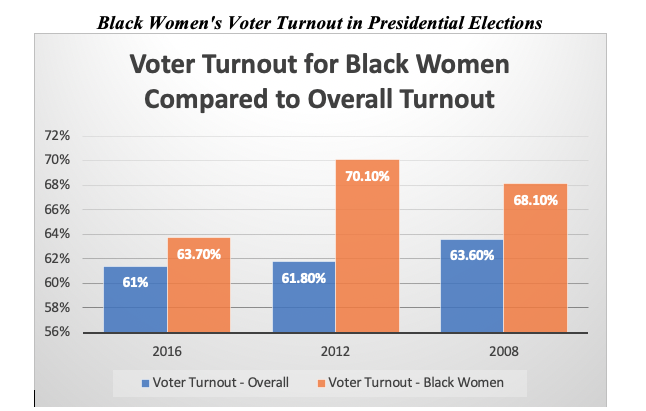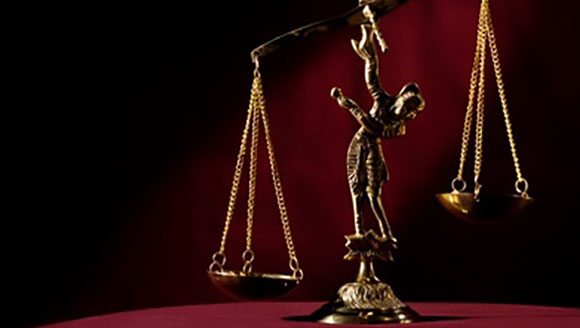By the Numbers: Black Women Become a Key Voting Bloc and a Path to Victory
Black women voted at a record 68.1 percent during the 2008 presidential election, outpacing all other demographic voting groups and establishing their presence as a formidable voting bloc. The surge in Black women voter turnout was often credited to voter enthusiasm over the candidacy of the first African American for president, frustration over the Bush administration’s handling of Hurricane Katrina’s aftermath, and the thinning of the Black middle class caused by the Great Recession of 2008. History repeated itself in 2012. Black women voted in high numbers—a historic 70.1 percent—the highest voter turnout of any other group. Black women were mobilized in the fight to protect the Affordable Healthcare Act and pushed for continued work on criminal justice reform. In 2016, Black women maintained their voting strength with a turnout rate of 63.7 percent. The numbers are clear: since 2008, Black women voters have consistently surpassed overall turnout during presidential election years by an average of 6.7 percent.[i] (see chart below)

*Data sourced from the U.S. Census Bureau Reported Voting and Registration 2008, 2012, 2016
We attribute general high voter turnout and enthusiasm within the Black community to a strong sense of responsibility and regard for the franchise, and this is particularly true in the case of Black women. According to the results of the Black Women’s Roundtable’s annual report, “Black Women in the U.S., 2018” and the National Coalition on Black Civic Participation’s Unity Election Day exit polls in 2014 and 2018, more than 74 percent of surveyed Black women voters reported voting out of a sense of responsibility rather than to support a specific candidate. This data demonstrates the importance of 501(c)3 (non-profit) voter engagement work in the Black community to connect voters to that sense of responsibility.[ii] Given past voting turnout numbers and the dangers of today’s aggressive political climate, we expect Black voters—particularly Black women—to continue to demonstrate their power as a key voting bloc and make a powerful impact on the presidential campaign of 2020.
Black Women’s Political Leadership Rising
In 2018, Black women stood at the crest of the blue wave that swept Democrats into Congress, voting at a rate of 92 percent for Democratic candidates. But Black women did more than vote. Motivated by a negative political climate and a lack of candidates addressing their unique concerns and issues, hundreds of Black women filed their candidacies for office. They broadened their political influence into governance, running for elected office—at all levels of government—with a vengeance.
The surge of Black women running for political office resulted in 25 Black women serving in Congress, four Black women in statewide seats, 275 Black women in state legislators, and seven Black women mayors among the largest 100 cities.[iii] Four of the five new Black congresswomen are under the age of 45 and come from very diverse backgrounds: Rep. Jahana Hayes was a teacher; Rep. Lucy McBath was (and continues to be) a gun control advocate; Rep. Ilhan Omar was a state legislator; Rep. Ayanna Pressley was a city council member; and Rep. Lauren Underwood was a nurse. Each of these Black women led campaigns based on the issues most important to Black women and their families, specifically healthcare, criminal justice reform, and education.[iv][v]
Black women also sought political representation beyond the halls of Congress, running for local and state offices, especially in the South. Stacey Abrams ran a strong, historic race to become the governor of Georgia, only to be robbed of the seat over voter suppression. In Alabama, Sheila Tyson, a five-year Birmingham, Alabama city council member, ran for county commissioner and won. Beverly Chester-Burton lost her first race for mayor in 2008, but in 2018 became Shively, Kentucky’s first African American mayor. Paula Dance was elected the first African-American, female sheriff in Pitt County, North Carolina. Merleyn Bell, a first-time candidate, won a seat in the Oklahoma House of Representatives.[vi] In Texas, 17 Black women were elected judges in Harris County. These victories have created excitement throughout the country. We believe Black women will continue to build on these wins and continue to run for office.
Issues That Matter to Black Women
According to the Black Women's Roundtable's recent Unity 2018 Power of the Sister Vote exit poll, safety net issues like Social Security, Medicare, and Medicaid, affordable healthcare, and criminal justice reform ranked high on the list of issues Black women want President Trump and 116th Congress to address.[vii] Half of Black women surveyed identified protecting Medicare, Medicaid, and Social Security as their top policy priority. One-third (33 percent) identified the protection of the Affordable Care Act as their second highest policy priority. We believe progressive candidates must address these issues —among others—to win the Black women’s vote in 2019 and 2020.
As the nation prepares for the 2020 presidential election, one thing is clear: Black women are a voting bloc to watch—and court. Black women will scour stump speeches for the issues that matter most on their agendas. They expect their leadership to be respected and invested in as constituents, voters, candidates, political managers, and organizers. We believe Black women will take their political leadership to new levels of success in 2020 and beyond. For those seeking to win the Black women’s vote, you would do well to recognize that Black women are the key to victory. If you want to win, recognize the numbers and follow the lead of Black women.
[i]https://www.census.gov/topics/public-sector/voting.html
[ii]https://www.ncbcp.org/assets/2019BWRReportBlackWomenintheU.S.2019FINAL3.22.19.pdf
[iii]https://cawp.rutgers.edu/fact-sheets-women-color
[iv] https://www.ncbcp.org/assets/2019BWRReportBlackWomenintheU.S.2019FINAL3.22.19.pdf
[vi]https://www.ncbcp.org/assets/2019BWRReportBlackWomenintheU.S.2019FINAL3.22.19.pdf
[vii]https://www.unitycampaign.org/ncbcp-unity-18-campaign-2018-election-day-exit-poll-results


 Equality Index
Equality Index  Senate Report
Senate Report  2020 SOBA Essays
2020 SOBA Essays  2019 Report
2019 Report 